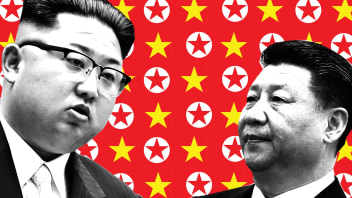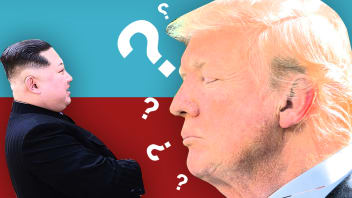https://www.thedailybeast.com/how-north-korea-could-start-world-war-iii
How North Korea Could Start World War III
A complex, ever-changing situation in North Asia could lead to simultaneous conflict in Europe and both ends of Asia—just like it did in 1914.
 Gordon G. Chang
04.02.18 4:46 AM ET
Gordon G. Chang
04.02.18 4:46 AM ET
Kim Jong Un, the North Korean supremo,
traveled to Beijing last week at the invitation of Chinese counterpart, Xi Jinping. President Donald Trump saw the visit as a good sign, but he’s undoubtedly wrong to be optimistic.
In fact, an invigoration of the China-North Korea alliance, a possible result of the officially “unofficial” meeting, makes this time resemble the hinge year of 1914.
The hallmark of this moment, like then, is a rapidly changing situation. In recent weeks, North Korea has transformed itself from isolated pariah to the driver of events. Kim has met with Xi and will soon talk to Moon Jae-in, the South Korean president, and Trump. Japan’s prime minister, Shinzo Abe,
is angling for a summit as well.
At the same time, Kim is raising expectations.
According to South Korean officials he met at the beginning of last month, he said he was “committed to denuclearization.” Kim during his meeting with Xi last week
used those same words. Whether Kim is sincere or not—he undoubtedly isn’t—he is accelerating developments in an especially troubled region.
And some, including Adelphi University’s Jonathan Cristol
writing on the CNN site, see these developments ending in conflict. In “Kim Jong Un’s Cunning Strategy Could Lead the World Down a Dangerous Path,” Cristol argues that Trump, aided by his pick for national security advisor
John Bolton, could be “angling for a failure and an excuse for war.” Harry Kazianis of the Center for the National Interest is also concerned, telling Vox the chance of war might increase if summit talks fail. The administration,
he says, is “putting all of our eggs in the summit basket” in what is “the ultimate Hail Mary.”
“Beijing’s aim is to turn a North Asia crisis into a test of Washington’s leadership, in other words, a challenge with global implications.”
Not everyone mixes metaphors so well, but everybody should be concerned. Scholars often muse about “accidental war,” but in this case armed conflict looks almost preordained. Armies have marched up and down Korean peninsula over the last two millennia, and although there has been general quiet during the last seven decades, the Korean War—the North Koreans call that struggle the “Great Fatherland Liberation War” and the Chinese label it the “War to Resist U.S. Aggression and Aid Korea”—remains unresolved, yet to be concluded by peace treaty.
At the same time, there has been dangerous mischief-making. “China’s original strategy with North Korea was evidently a long game to let a strategic crisis develop, engendered by Pyongyang’s weapons program that would make the world look to China as the only means to resolution short of war,” Brock University’s Charles Burton, who studies Beijing policy toward Pyongyang, told The Daily Beast.
Related in World News

Did Xi Just Side With Kim Jong Un to Get Back at Trump?

Trump’s Shoot-from-the-Hip Korea Diplomacy

Will War Games Derail the Kim-Trump Summit?
China’s grand strategy, in other words, is to use the Democratic People’s Republic of Korea to obtain decades-old goals. “China,” Burton writes, “would then resolve the crisis by engineering regime change in the North on condition that the U.S. withdraws its troops from Japan and South Korea and abandons its defense of Taiwan.”
Beijing’s aim, therefore, is to turn a North Asia crisis into a test of Washington’s leadership, in other words, a challenge with global implications.
“Kim apparently wanted to cut the Chinese out by making an offer to talk directly to Trump.”
Yet by raising the stakes for the U.S., Beijing has also upped the consequences to itself. Chinese leaders would perceive a successful outcome for America to be a grievous setback for themselves. “Such a blow to China’s national pride would have major global consequences,” Burton notes.
Up until last week, China was having a bad 2018. Beijing, which has been at the center of the international community’s efforts to disarm the Kim family since the Three-Party talks of April 2003, looked to be on the verge of exclusion from the most consequential discussions in the region.
Kim apparently wanted to cut the Chinese out by making an offer to talk directly to Trump. And Trump’s on-the-spot acceptance was sound because the Chinese have generally been a malign influence on denuclearization efforts. In the Six-Party talks last decade, for instance, China more often than not used its influence to help Pyongyang, not Washington and the international community.
Get The Beast In Your Inbox!
Daily Digest
Start and finish your day with the top stories from The Daily Beast.
Cheat Sheet
A speedy, smart summary of all the news you need to know (and nothing you don't).
By clicking “Subscribe,” you agree to have read the
Terms of Use and
Privacy Policy
Since the breakdown of those talks at the end of last decade—Pyongyang walked away after Beijing prevailed on the Bush administration to ease up pressure on the North—China has delayed international sanctions and then violated those measures, sometimes openly. Chinese banks, from all indications,
are still laundering money for Pyongyang.
Moreover, Beijing for decades
supplied the North with components, equipment, materials, and, in all probability, technology for both its nuclear weapons and ballistic missile programs. That’s one of reasons why a destitute state could make fast progress building the world’s most destructive weapons.
“The situation in North Asia is becoming inherently unmanageable for any cabinet, hawkish or dove-like, to handle.”
And now Chinese leaders showed off their relationship with “Fatty the Third,” as Chinese netizens like to call Kim, at the Beijing meeting last week and thereby gave him the means to resist global efforts to take away his weapons.
Many observers, like Adelphi’s Cristol, point to the dangers in Trump replacing doves with hawks in what is now called the “War Cabinet,” but the real risk at the moment is something entirely different: the situation in North Asia is becoming inherently unmanageable for any cabinet, hawkish or dove-like, to handle.
Today, we need to remember how a dispute over Serbia a hundred years ago triggered a German invasion of Belgium, Luxembourg, and France and resulted in fighting across the globe. The defining feature of the month leading up to the Great War was complexity. After the assassination of Archduke Franz Ferdinand at the end of June 1914, most every European power rushed to mobilize forces and enlist allies.
Although some of the alliance relationships were then set, leaders did not know how some nations would line up and whether alliance obligations would in fact be honored. Changing relationships—and the number of participants—made the situation, before the breakout of hostilities and even during the first months of war, almost impossible to manage.
Today, there is similar uncertainty with the most critical issue being China’s role. China, by forcing Kim to travel to the Chinese capital, reinserted itself in the crisis, yet it is not clear how far it will go to support the DPRK, as the Kim regime calls itself, in the event of attack.
“The defining feature of the month leading up to the Great War was complexity.”
“No matter how the international and regional situation changes, we will both firmly grasp the global development trend and the overall situation of the China-DPRK relationship, strengthen our high-level exchanges, deepen our strategic communication, expand our exchanges and cooperation, and benefit the people of both countries and the people of all countries,” Xi Jinping told Kim during the Beijing meeting. The
Washington Post interprets these ambiguous words as a pledge to defend.
If that’s the correct reading, that sentence reinforces the message of
Global Times, the nationalistic tabloid controlled by
People’s Daily, China’s most authoritative publication. “China should also make clear that if North Korea launches missiles that threaten U.S. soil first and the U.S. retaliates, China will stay neutral,” the paper declared in an
August 2017 editorial titled “Reckless Game Over the Korean Peninsula Runs Risk of Real War.” “If the U.S. and South Korea carry out strikes and try to overthrow the North Korean regime and change the political pattern of the Korean peninsula, China will prevent them from doing so.”
American hawks do not talk about the editorial and assume Beijing will sit on the sidelines in the event of a strike on the North’s nuclear and missile facilities. It is, however, unlikely that assertive Chinese leaders will voluntarily give up an opportunity to accomplish decades-old goals and do nothing. As Arthur Waldron, the prominent China historian at the University of Pennsylvania, told The Daily Beast Friday, “They actually believe they are the strongest country in the history of the world.”
“American military action against North Korea will probably result in simultaneous conflict in Europe and in both ends of Asia.”
Moreover, Washington does not appear to have adequately considered the reaction of nominal American ally South Korea, now governed by the pro-Beijing, pro-Pyongyang Moon, and Moscow, Pyongyang’s former guarantor and once again its backer. Perhaps Washington can control Seoul, but it has little influence over Moscow. And Moscow does not need to directly aid Pyongyang to destabilize the world.
Vladimir Putin could—and probably will—take advantage of a crisis in North Asia to grab the portion of Eastern Ukraine he does not now control and perhaps pressure the Baltics, America’s NATO allies. At the same time, Iran could cause even more trouble in its surrounding regions and China itself could move deeper into its peripheral waters or strike again into Indian-controlled territory. American military action against North Korea, therefore, will probably result in simultaneous conflict in Europe and in both ends of Asia.
“As country after country realizes she in fact has genuinely serious interests in the opaque developments of the months ahead, we enter the perilous realm where the sheer force of numbers makes possibilities increase not arithmetically but exponentially, greatly increasing the gravity of the policymaker’s role, while simultaneously pushing it toward impossibility,” a concerned Waldron told me Friday.
In other words, the current complexity makes sound decision-making exceedingly difficult as imponderables multiply fast. “With any bad luck at all, we may well get a chance to relive in East Asia what transpired in Europe in the early 1900s, when the world’s major powers thought they knew who they could rely on to come to their defense, who they could deter from going to war, and how costly hostilities might become only to discover that their assumptions were dead wrong,” Henry Sokolski of the Virginia-based Nonproliferation Policy Education Center wrote to The Daily Beast this weekend. “What could make things different this time, however, is the fighting could go nuclear.”















 Gordon G. Chang
Gordon G. Chang




